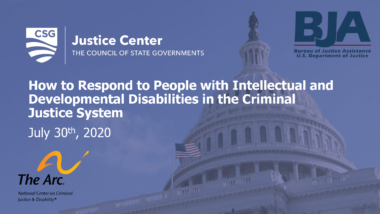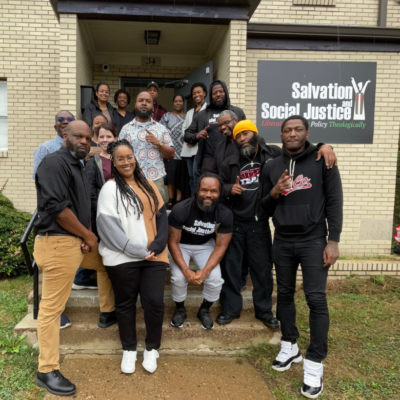How to Respond Effectively to People with Intellectual and Developmental Disabilities in the Criminal Justice System
Hosted by The Council of State Governments (CSG) Justice Center and Bureau of Justice Assistance (BJA)
People with intellectual and developmental disabilities (sometimes known as I/DD) are an often overlooked population in the criminal justice system because of a lack of identification and understanding and service gaps that prevent providers’ abilities to address their needs. At the same time, they are also often victimized by people without these disabilities, which can sometimes lead to sustained involvement with the criminal justice system. Criminal justice professionals who want to effectively respond to their service and delivery needs and reduce the prevalence of people with intellectual and developmental disabilities in the criminal justice system will first need to improve their knowledge and awareness about people in this population. Then, they must commit to training that is focused specifically on ways to address their needs.
This webinar discusses the prevalence of intellectual and developmental disabilities within people in the criminal justice system and will explain the Pathways to Justice model that can be used to better understand how people with these disabilities become involved in the criminal justice system. It also features conversations about common challenges that they face and criminal justice professionals experience when encountering each other at each intercept point. The webinar also highlights how The Arc’s National Center on Criminal Justice and Disability is supporting professionals with training and technical assistance.
Panelists:
- Leigh Ann Davis, Director, Criminal Justice Initiatives, The Arc, National Center on Criminal Justice and Disability
- Maria Fryer, Policy Advisor, BJA, U.S. Department of Justice
- Allison Upton, Project Manager, Behavioral Health Division, the CSG Justice Center
Find other events
You might also be interested in
In response to growing calls for police reform in New Jersey, particularly following the shootings of Najee Seabrooks…
Read More Apply Now: Join a Learning Community for Community and Crisis Response Teams to Improve Responses to Youth
Read More
Apply Now: Join a Learning Community for Community and Crisis Response Teams to Improve Responses to Youth
Read More
 Apply Now: Join a Learning Community Focused on Substance Use and Overdose Community Response Programs
Read More
Apply Now: Join a Learning Community Focused on Substance Use and Overdose Community Response Programs
Read More




















